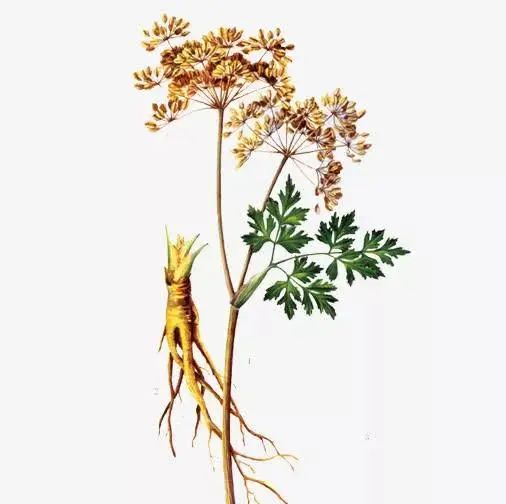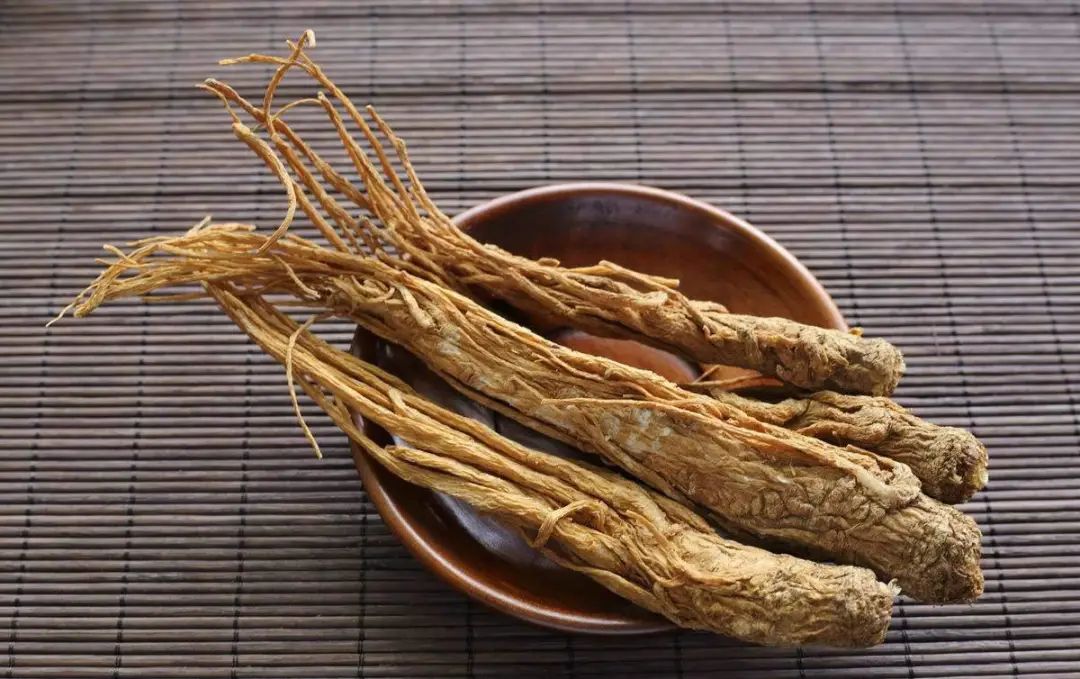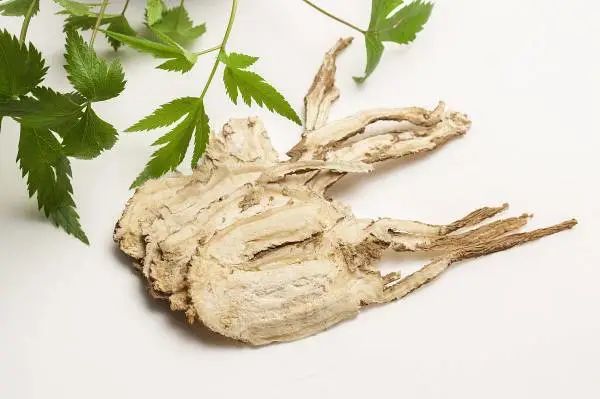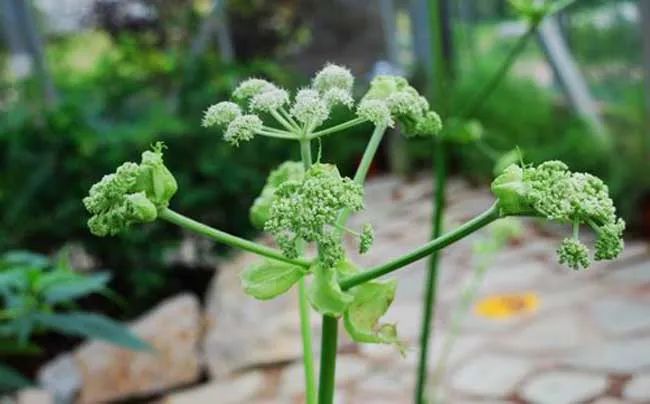
Click the blue text to follow us
Angelica Sinensis (Dong Quai)
Angelica Sinensis is the dried root of the plant belonging to the Apiaceae family, slightly cylindrical in shape, with 3 to 5 or more lateral roots at the lower part, measuring 15 to 25 cm in length; the surface is light brown to brownish-yellow, with deep and shallow wrinkles and some protrusions, the main root is uneven; the cross-section is yellowish-white or light yellow-brown, with a relatively thick outer bark, and some cracks and brown spots in the middle; it has a strong aroma, with a sweet, spicy, and slightly bitter taste.

It is important to note that if the root is dry and lacks oil, has a woody texture (the quality of the herb becomes hard and dry like wood) or has a greenish-brown cross-section, it should not be used medicinally.
Growing Environment
Angelica Sinensis is a low-temperature, long-day crop, suitable for cool, high-altitude climates, primarily produced in the southeastern part of Gansu Province, particularly in Min County (Qinzhou), where it has a high yield and good quality. It is also cultivated in Shaanxi, Sichuan, Yunnan, and Hubei provinces. Harvested in late autumn, the roots are cleaned of fibrous roots and soil, soaked, sliced thinly, and then dried in the sun or at low temperatures.

Pharmacological Effects
Angelica Sinensis mainly contains various volatile oils, organic acids, etc. The effective active substances in Angelica Sinensis can vary with different extraction processes, compatibility ratios, and preparation methods, leading to changes in absorption, distribution, metabolism, and excretion in the body, thus affecting its efficacy.

For example, raw Angelica Sinensis nourishes blood, invigorates blood circulation, regulates menstruation, and alleviates pain; it is commonly used for blood deficiency, dizziness, palpitations, irregular menstruation, amenorrhea, dysmenorrhea, abdominal pain due to deficiency and cold, rheumatic pain, trauma, carbuncles, and constipation due to dryness of the intestines.
In contrast, wine-prepared Angelica Sinensis (the preparation method involves mixing clean Angelica Sinensis slices with yellow wine, steaming thoroughly, then drying over low heat) primarily promotes blood circulation and regulates menstruation; it is commonly used for amenorrhea, dysmenorrhea, and rheumatic pain.
Efficacy and Applications
Modern research indicates that Angelica Sinensis also possesses anti-inflammatory, analgesic, hematopoietic enhancement, anti-tumor, anti-organ fibrosis, immune regulation, and treatment for cardiovascular diseases, with wide clinical applications, including treatment for renal syndrome, diabetic complications, and anemia.

01
Anti-inflammatory and Analgesic
✦
The various components in Angelica Sinensis, including phthalides, organic acids, and polysaccharides, exhibit varying degrees of anti-inflammatory and analgesic activity, and can treat various inflammatory and painful diseases.
The anti-inflammatory mechanism primarily involves blocking the expression of related proteins/genes in inflammatory signaling pathways, inhibiting the release of inflammatory mediators, and increasing the levels of anti-inflammatory factors, maintaining the heightened sensitivity of immune cells to external stimuli; the analgesic mechanism mainly involves inhibiting the release of pain-inducing substances or blocking the amplification of pain sensation.

02
Effects on Hematopoietic Function
✦
Angelica Sinensis influences hematopoietic function mainly by inhibiting the aging of hematopoietic cells and promoting the generation and proliferation of these cells. The polysaccharides in Angelica Sinensis have a significant therapeutic effect against the aging of hematopoietic stem cells and are one of the main active substances for hematopoiesis.
03
Anti-tumor
✦
Angelica Sinensis exhibits certain anti-tumor effects in cancer patients, primarily related to its volatile oils.
Studies have shown that the volatile oils of Angelica Sinensis can effectively inhibit the growth of cancer cells, and the higher the concentration of the volatile oils, the faster the reduction in cancer cell numbers.

04
Anti-organ Fibrosis
✦
The polysaccharides in Angelica Sinensis can effectively prevent the development of organ fibrosis.
For instance, in patients with liver fibrosis, clinical studies have shown that Angelica Sinensis improves liver function and biochemical tests more effectively than conventional Western medicine liver protection treatments, demonstrating good liver-protective effects.
05
Immune Regulation
✦
Angelica Sinensis can enhance the body’s immunity; clinical trials have found that the polysaccharides in Angelica Sinensis can enhance the non-specific immune function of the body, effectively improving the phagocytic function of mononuclear macrophages, helping phagocytic cells quickly recognize and engulf foreign substances.
Additionally, the water extract of Angelica Sinensis can increase the number of immune cells in the body and promote the production of specific immune antibodies, accelerating the synthesis of B cells and T cells, enhancing both non-specific and specific immune functions.

06
Effects on Cardiovascular and Cerebrovascular Health
✦
Angelica Sinensis has significant therapeutic effects for patients with cardiovascular and cerebrovascular diseases, effectively preventing and treating hyperlipidemia, hypertension, and atherosclerosis.
The ferulic acid and polysaccharides in Angelica Sinensis can inhibit platelet aggregation, and the organic acids it contains have anti-atherosclerotic effects, providing good preventive protection against arrhythmias; the methanol extract of Angelica Sinensis can effectively improve ischemic stroke brain injury; the volatile oils can significantly lower blood pressure, increase coronary, cerebral, and peripheral blood flow, reduce myocardial oxygen consumption, and lower serum cholesterol and low-density lipoprotein cholesterol, effectively treating hyperlipidemia and atherosclerosis.

Precautions
Due to its sweet and warm nature, it is not suitable for those with damp-heat obstruction, lung heat phlegm-fire, or yin deficiency with yang excess; also, due to its moistening and laxative properties, caution should be exercised in cases of diarrhea.
Angelica Sinensis contains coumarin compounds, which have anticoagulant effects, and when used in conjunction with warfarin, there is an increased risk of bleeding, such as nasal bleeding, gum bleeding, rectal bleeding, and subcutaneous bleeding.
Although Angelica Sinensis is a traditional Chinese medicine, to ensure safe use, it should be taken under the guidance of a physician.
END
Images sourced from Pexels; if there is any infringement, please contact us for removal;
This article is for reference only; please consult a professional doctor if you have any concerns.

